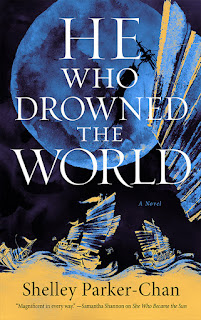Anyone who has hiked through time knows the town of Pocket. It’s the place travelers first reach after they stumble away from their hometime, passing through on their way to any other when. To Calisto, Pocket is home. They love their grandmother’s shop, which is filled with clothes from every era that are used to make costumes for time travelers. Calisto has no intention of traveling—it’s too dangerous. For Fawkes, traveling is life. He put on time boots when he was young and has been stumbling through eras ever since. When he floats into Pocket, Calisto meets him for the first time, though Fawkes has seen Calisto—in glimpses of what hasn’t happened yet. He’s also seen the villains chasing them both. Now Calisto and Fawkes must rush—from Shakespeare’s London to ancient Crete to California on the eve of a millennium—to save Pocket, and travelers, from being erased. From the Lambda Literary Award–winning author of The Heartbreak Bakery comes a fairy-tale romance that weaves in and out of time, from kiss to kiss and costume to costume.
"Destiny is a temporal disorder."
A.R. Capetta's Costumes for Time Travelers is a delightfully cozy time travel adventure. It pays homage to a few staples of the genre while giving its own spin, with a fun focus on tailoring not only as an art but also as a kind of time travel. The nonbinary main character Calisto is a young and enthusiastic tailor apprentice who has never time traveled, and the contrast with time savant Fawkes makes for a fun dynamic.
Theirs is a love story out of order, sweet and gentle. In fact, given the premises I expected far more angst than what I got, but that's not necessarily a bad thing. The book ambles gently, setting up a threat to reality, but it never feels like the stakes are too high. Perhaps the narration lacks some urgency in that regard.
The points of view are also all over the place, with an open third person narration that jumps too suddenly from one perspective to the next. It's a lovely book, but it may have benefitted from some rewriting.
Costumes for Time Travelers is a sweet summer read.
✨ 3.5 stars
📚🥾 So you want to read about out-of-order time-travelers?
Here's my review of Ian McDonald's Time Was
















